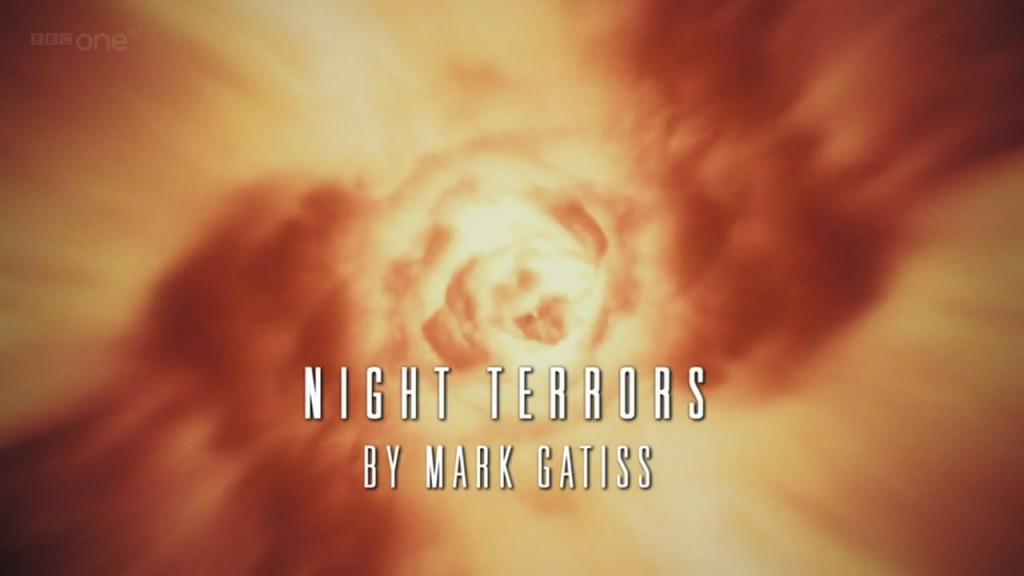
Spike: Conceptually this episode reminded me a lot of the Season 2 episode ‘Fear Her’ which saw the Doctor descending onto a small suburban estate under assault by line-drawn monsters. ‘Fear Her’ is the one episode of Doctor Who I’ve never re-watched, I’ve been through the series twice again on DVD and ‘Fear Her’ is the only episode I skip. Now ‘Fear Her’ is a bad episode but so are episodes like ‘Love and Monsters’, ‘The Lazarus Experiment’ and ‘Journey’s End’ and I never skip them. This is partially because I can still find stuff to enjoy in those episodes, but mostly because ‘Fear Her’ in its attempts to deal with a difficult issue, in this case the fallout of an abusive parent, became a ‘very special episode’ and really couldn’t support the content. There’s a fine balance you have to draw when dealing with issues like this, especially when written specifically for a kids show, and I remember ‘Fear Her’ being so blunt and graceless as to actually come across as almost insensitive.
‘Night Terrors’ used a similar concept to ‘Fear Her’, a child unwittingly causing harm to their dwellings without realising it, but had a much different angle and much different emotional core. With its focus on childhood fears, and the very specific fear of abandonment, layered into what was ostensibly a haunted house story. Now I’m a far bigger fan of Gatiss’ writing than most so I’m very interested in how the rest of the crew reacted to this episode. Personally I thought the episode did a really good job of setting tone and atmosphere and the visual style seemed to really harken back to the old horror anthology shows like Tales from the Darkside and Hammer House of Horror. In fact one of the things I was most taken with this episode was the direction which seemed to eschew the traditional look of the show, in favour of something a little more desaturated and shadowy. I think it looked gorgeous at times and the change in visual style really helped to sell the episode as being different from the rest of the run.
Before I waffle on anymore I’ll throw it out to the crew, so to kick things off did the ending work for you guys and gals?
Ben: The ending was a little oversold, I thought, but effective enough- we could maybe have used “you are my son” repeated one less time. It shared the same major flaw as the rest of the episode, though, which I’ll get to in a second.
I’d agree on the visuals, which were easily the high point of the story- the set design on the doll’s house was spot-on, with all the slightly iffy proportions, the monsters were effectively creepy even if every series trailer so far did its best to ruin them, and the lighting and direction were extremely accomplished for television.
The problem with all these creepy visuals, the tension-building and the big emotional finale was the music.
I’ve grumbled about Gold’s work before, but this really demonstrated what I’ve been- the man’s music is good enough in isolation, and well suits to the “bigger” stories like ‘A Good Man Goes to War’, but he has very little grasp of subtlety. Every time this story might have been effectively frightening or suspenseful, it was shattered by great blasting chords and themes that did their best to force the mood instead of letting the story create it. It’s not all Gold’s fault- the mixing and volume levels were a bit of a mess, and came close to drowning out the dialogue and creepy doll-laughter at times, but the story would have been improved fivefold if it’d simply had less score, and let the shadowy house and distant giggling sounds build atmosphere on their own.
Aside from all that, though, very solid, and Gatiss’ best since ‘Unquiet Dead’.
On the ‘Fear Her’ note, there were resemblances, but while that story was more of a straight lift from the little-known horror film Paperhouse, this felt like an episode of Sapphire and Steel, which is no bad thing.
Spike: Nice to see another Bernard Rose fan in the group, although comparing ‘Fear Her’ to his great debut feels a little disingenuous, although that could be my irrational hatred talking. Good catch on Sapphire and Steel, that was one of the shows I was trying to remember which seemed an obvious inspiration. Given what I know of Gatiss, and his penchants for homage and pastiche, I wouldn’t be surprised if the episode has been devised as a grand homage to those weird anthology shows from the late 70s and 80s.
I feel I should probably preface my love for Gatiss’ writing before we continue. His work on The League of Gentlemen, a very baroque and grotesque British comedy series, was an entry point for me into a lot of classic British horror. I spent many a summer-night tracking down VHS and DVD copies of the countless horror films referenced and homaged in that show and I’ve had a great deal of affection for Gatiss’ writing ever since.
Ben: Oh, there’s no quality comparison with Paperhouse, but the spectacle of a small child’s drawings coming into life, culminating with a demonic representation of her fears of her father, was just a little overfamiliar.
Count me in with the League of Gentlemen fans, but I’m also very impressed on Gatiss’ Sherlock writing, which was exceptional last year.
Spike: One of the things that strike me about Gatiss’ work on Doctor Who is that it always feels a little out of step with the rest of the run. His episodes definitely tend to have a more classic Who feel to them and it means that they sometimes stick out like a sore thumb amongst more New-Who styled episodes. I’m not really using classic Who as a barometer of quality, as I think Gatiss shares classic Who’s issues with pacing and resolution, but there’s definitely a tonal difference between his work and the show and work of writers like RTD and Moffat.
But yeah his work on Sherlock last year was great, in thank the finale of the last season (which he penned) was one of my favourite bits of TV last year, just really well thought out, structured and executed.
Adam: God, yes, Murray Gold is terrible. Either his score is forgettable background noise, or it’s blasting in your face to add (usually unnecessarily) to the emotional climax. I definitely prefer emotional climaxes when they’re underplayed, so Gold really isn’t for me. To his credit, he’s dialled it down a lot since Moffat took over, but here he seemed to be slipping back into his bad habits.
As Spike said above, this definitely continues the trend of “let’s redo the Russell T. Davies run but have it suck less” that’s been disappointing me about Moffat’s run to date. I mean, yes, it’s admirable to try and do something better, but it’s almost impossible to do worse than ‘Fear Her’ (yet RTD managed with ‘Love and Monsters’!) so that seems like low-hanging fruit. And I say that as a fan of Gatiss as well–I loved League of Gentlemen, and his episode of Sherlock was great. But with Doctor Who he seems too locked into the old formula which doesn’t appeal to me very much–lots of pointless running around corridors. And man, that scene where the kid JUST HAPPENED to look out as Rory and Amy were walking by and JUST HAPPENED to say something that could be misconstrued as scary, to give the kid an excuse to send them into the cupboard…that is some lazy writing, right there.
I will say, though, that (aside from the scenes with the Doctor pretending to be a social worker) the second half improved a lot on the first, and that was enough to redeem the episode in my eyes. But maybe we can talk about that later.
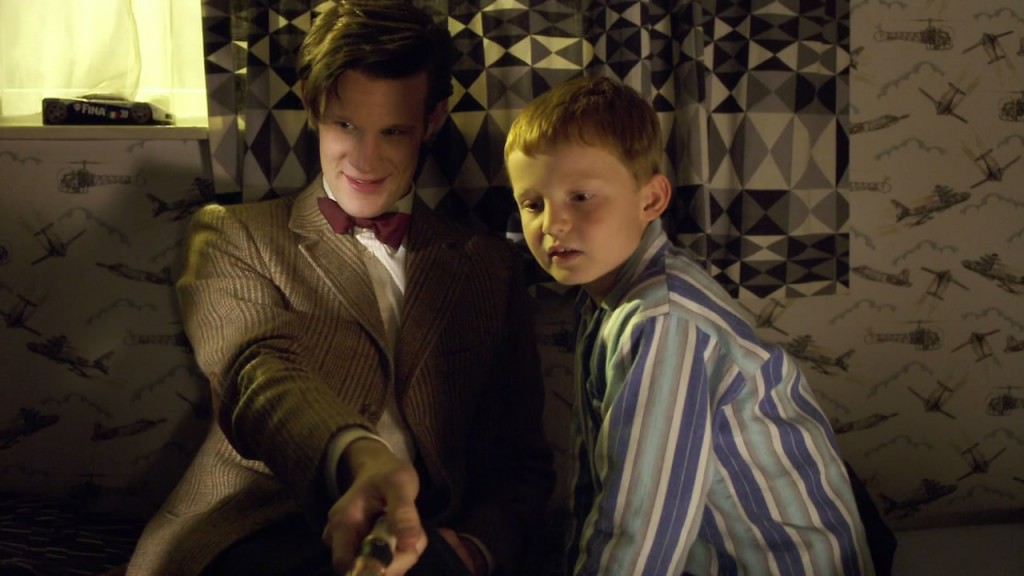
Spike: The episode had the weird problem of feeling kind of padded at times and also busting at the seams with ideas which then got abandoned. The little old lady getting trapped in the doll house felt like a plot that had been half excised in the second or third draft. I would have liked a little more build up to be honest, a growing sense of this kids powers getting out of control, rather than just a sudden spate of plot-related disappearances. But despite certain ideas feeling a little undercooked and other ideas feeling a little over-egged I bought into the central relationship between George and his foster father enough to be complete on board with the episode.
Adam: The problem with the first half is that so little seems to be at stake. I guess you can argue that the fact that the psychic paper got a summons makes it important, but otherwise, it kind of makes it seem like the Doctor comes rushing to the rescue every time a child is afraid of the dark. And while I get the appeal, they made that so central to the episode that it just came off as pointless and cutesy–again, it was falling back into the trap of “isn’t the Doctor awesome?!? He’s your best friend and he’ll always be there for you! And if you’re a girl or a gay dude, he may cast you an occasional smouldering glance, even!” In the meantime, I was with Amy–shouldn’t they be doing planets and history, and not wasting time in a council estate?
This is frustrating, because when the actual plot kicked in I thought it had some real impact, but they wasted too much time getting there. Some people in the forums were complaining that all it seemed to take was a hug to solve the kid’s problems, which made Alex out to be kind of a crummy dad, but it was more than that–the kid was terrified of being found out as a non-human, and for the dad to understand that and then accept him as his son anyway–that’s quite touching.
Spike: To be fair to Moffat Season 5 and 6 have thus far limited the contemporary earth stories as much as possible. I think out of twenty two episodes thus far only three (four if you count ‘Amy’s Choice’) have actually been set in contemporary England.
Adam: Of course, now you have the problem of a kid who can wish his parents away to the cornfield any time he feels like it, and if Alex is aware of that his fear of his son has the potential to warp him into something unpleasant…but I guess that’s just a metaphor for parenthood anyway. At least the kid is fundamentally well-meaning.
Spike: I’m a sucker for parental reconciliation stories, show me the last five minutes of The Royal Tenenbaums and I turn into a puddle of gooey emotions, so this was an easy sell for me. I think the MVP of the episode, and what made the entire story work, was Daniel Mays. He really managed to sell a script which didn’t support his character and breathe life into a character that could have been a cipher. You got a real sense for the concern Alex had for his son which he was trying to not verbalise and Mays was just a great foil for Matt Smith throughout the second and third act.
Ian: After lamenting the urgent pacing last week (and most of the first half of the season), this was pretty much just what the Do- just what was needed. Sorry, that would’ve been too awful a pun even for me.
I’m glad to hear so much positivity from my crew-mates on this episode. The more of these we do, the more I seem to fit into the “Old School Who” camp. It was refreshing to see fully fleshed out scenes that breathe instead of wheeze from too much running around. As far as plot and theme go, this was very straightforward of course. Although that’s no bad thing after the rather muddled episodes we’ve argued the toss over so much. It was fantastic to focus on fewer targets and see them really hit their marks, even if they were a bit obvious about it at times, as opposed to skirting past a whole mess of them. That was always going to be on the cards since this established itself right off the bat as a “kids” episode – that is to say, one for the parental units to watch with their arm around Junior. I don’t think adjusting your critical thinking accordingly is integral to enjoying ‘Night Terrors’; however it might add an extra star or two to your final rating.
The point about things getting discarded along the way (trauma granny, etc.) is a good one, but ultimately this had its heart in the right place too much for things like the Doctor just happening to look down at George’s window at the right time to see him to be a problem.
Spike: Just want to quickly mention, now that Ian’s reminded me, but I do love how the 11th Doctor is characterised as am almost protective deity of children. The ninth and tenth were explorers and lonely gods, very much operating in an adult world and in adult spheres. The 11th Doctor is characterised by his general compassion and respect for children, the fact that he’s there for them. It’s a theme which has recurred a number of times throughout Moffat’s run, even to the point of his first interactions with people being in answer to child-Amelia’s request for help.
Kristina: Well, I hate to rain on the praise parade, but I really did not like this one very much, though there were moments that I enjoyed. I was intrigued by the idea of setting up the Eleventh Doctor with a child again, because Matt Smith works brilliantly with them, but the entire time I kept thinking about how this episode felt like an inferior mash-up of ‘The Lodger’ and ‘A Christmas Carol’ from Season Five. There are good ideas here, but I’ve seen them executed far better elsewhere. This episode just felt half-baked to me. The reveal of what the child is was a “Huh?” moment for me, and since I didn’t buy into that explanation, the episode crumbled for me. The big emotional reunion had zero impact on me. I was also disturbed by the ending, which strongly implies that the father is not going to let his wife in on the little secret that their son is an alien and that her memories have been screwed with.
The design of the dolls was creepy as hell, the cinematography in the episode is beautiful, and Matt Smith is always fun to watch, but this one just didn’t fully click for me. I will say that the moment that I appreciated the most was when The Doctor used the sonic to bring the toys to life in order to drown out the adults arguing in the next room. Once I realized why he was doing it, it worked like gangbusters for me. Who hasn’t heard their parents having a fight in the next room as a kid and tried to drown it out? I know this is a show for all ages, but when they aim something squarely at the kids, be it the little ones hiding behind the couch or the little ones inside of us old geezers, they never miss.
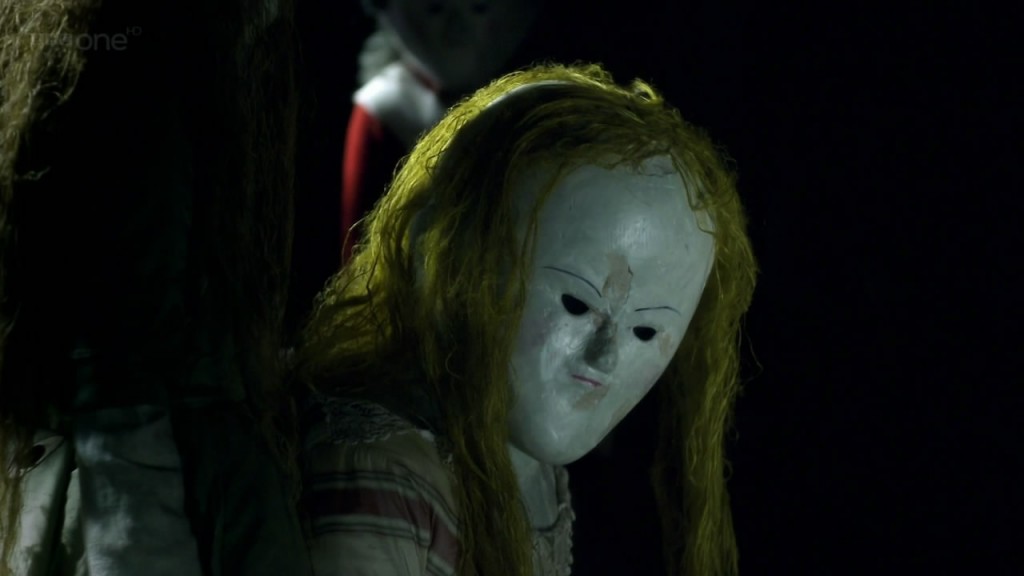
Adam: A couple problems with the evil dolls. First of all, my first thought when they showed up was “Oh, creepy dolls AGAIN?” before I realized that…Nu Who hasn’t really done creepy dolls before, unless I’m forgetting something. It just seems like the kind of thing that’s a cliché for Doctor Who, because it’s such an obvious mix of the childish and the terrifying. Obviously creepy dolls are a cliché elsewhere, too. You expect the monsters on Who to be more original, even when they’re kind of lame (giant rooster monster was certainly original, whatever else you want to say about it…)
Secondly, a dollhouse? Really? I’m reminded of what supposedly happened behind the scenes of Grant Morrison and Sean Murphy’s comic Joe the Barbarian, in which a 9-year-old boy’s house becomes a huge fantasy realm. Morrison was going to populate the world with teddy bears and stuff, but Murphy pointed out that a 9-year-old boy isn’t going to own teddy bears, he’s going to have Transformers and Batman toys. I think Gatiss needed Sean Murphy there to point out that this 8-year-old boy is unlikely to own a dollhouse. I mean, I’m not judging, but it seemed more like Gatiss wanted to play with childhood imagery and shoved a dollhouse in there. It kind of smacked of a lack of appreciation for how kids operate–an adult fetishizing childhood rather than something meant to actually engage with kids, for all that the episode was supposedly aimed at their primal fears and hopes.
Kristina: I was struck by how much the faces of the dolls reminded me of the baddies from ‘Girl In The Fireplace’, but I didn’t mind that they seemed to be drawing from their well of creepy. If it works, use it. Besides, it’s not like they can unleash an army of Chucky dolls on this show.
Spike: Going into what you were saying I just naturally assumed the dollhouse was an old childhood toy of the mothers, which had been passed down without too much thought. However I’m pretty sure that was just me overthinking the plot.
But yeah, you’re definitely right that it seemed an odd thing for an eight-year old boy to have, especially when the episode showed robots and dinosaurs and other far more boyish toys dotted around his room. I think you’re bang on the money that Gatiss was trying to use specific imagery in the show, which didn’t really fit in with the characters.
Adam: You can explain the dollhouse, but it’s central to the episode, so it really should have been something more true to an 8-year-old boy’s psychology, I think. Even so, as I say, it’s a bit of a cliché…they could have come up with something slightly more creative, like a Scooby-Doo esque haunted house, or…I don’t know. Something that would legitimately terrify an 8-year-old boy.
Spike: That dollhouse legitimately terrified a twenty-six year old Spike, so I can buy him being creeped out by the thing. Then again I’ve always been a bit wary of Dollhouses and Dolls after a bit of Jan Švankmajer related trauma in my childhood.
All kidding aside, I did find the doll attack, in which the landlord got turned into a doll, to be actually kind of legitimately freaky. Largely due to the effects work used, there was just something really unearthly and unreal about the entire process.
Kristina: I cringed at the doll attacks, too. The giggling voices and eerie faces were bad enough, but when I saw that the Amy doll actually had red hair, I was repulsed in the best possible way.
Spike: Yeah, for whatever reason the Doll’s retaining a little of their victim’s appearance was one of the freakier aspects.
Ben: Actually, that whole house was kind of Švankmajer, wasn’t it? Though you can imagine the complaints the BBC would have attracted if the story had been anywhere near the level of messed-up as his Alice.
The boy seemed to have plenty of normal toys for a child his age, anyway – I find the dollhouse being something that belonged to his mother (and was obviously stored because it scared him) perfectly plausible.
(We did get evil dolls in the 70s, made by the Autons, which were toys that came to life and strangled the parents. That’s the most complaints the show ever attracted, and the BBC actually issued an apology for it!)
Ian: The dolls didn’t bother me in the least, nor did their abode. I can understand people maybe feeling like they were a little old hat, though. Plus, they weren’t as good a monster of the week as the anti-bodies from last time. I could see the dolls/dollhouse being a lot creepier to the little ‘uns obviously, but they still provided enough menace for Darvill and Gillan not to look ridiculous running around and screaming. By the way, it pained me to see how badly Rory handled that “surprise attack” on the doll that looked a bit like Mick Hucknall. After his heroism last week, I thought he hurt his new macho standing by completely fluffing that and letting Amy get doll’d up. Although part of me thinks that might just be Gatiss taking the easy route with Rory since he was very much a background, B-story guy this time out.
As for the deeper significance of the dolls and the house itself, I thought everything was handled well enough to cater to all of the hypothetical living room audience. I think sometimes we run the risk of forgetting the other viewers these are created for, so it’s actually a very delicate balancing act keeping everyone interested. Ideally, the kids catch on to what’s happening soon enough for them to feel the themes and deeper meanings dropping into place as it all unfolds. I thought this story got the balance right overall, in that regard.
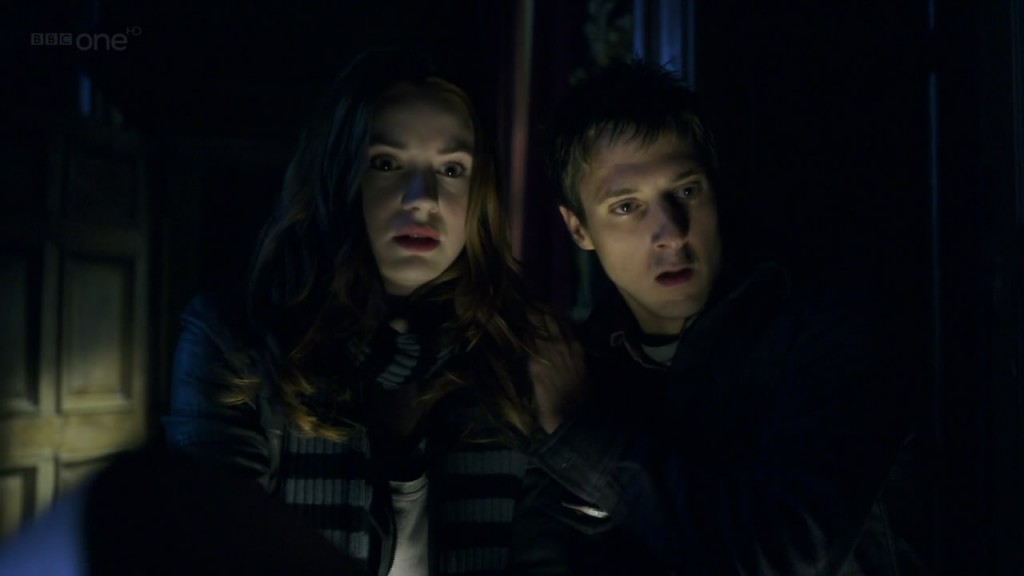
Kristina: I have to agree with you about Rory standing by while Amy was attacked. Why the hell didn’t he rush at the dolls? Why did he just stand there with a dumbfounded look on his face? We’ve seen him fight like hell for Amy before, so that moment stuck out, and not in a good way.
Spike: I’m writing an awful lot this week, so I’m going to try and curtail my comments after this. But I slowly realised that Rory is pretty much ‘the companion’ in Moffat’s run of Doctor Who. Largely because Amy, whether due to how she is written or Karen Gillen’s performance, comes across as far too nutty and nonplussed to really fulfil the traditional companion role (which is to be an audience surrogate and be appropriately menaced).
Rory with his pragmatic outlook and general high-mortality rate fits the criteria far more than Amy. It means that Rory and Amy have very specific functions within the TARDIS without either feeling like a third wheel.
Ian: Loved his little “we’re dead… AGAIN!”, while we’re on that subject.
Spike: Rory does seem to be getting the lion’s share of quips and asides at the moment. I kind of love Amy and Rory’s dynamic, just because I love their constant back and forths and how much chemistry Darvill and Gillen have.
Ian: With each passing episode, I feel like Rory is becoming a metaphor for metaphors. We all know the way it feels when you’re watching or reading or listening to something wonderful and the deeper meaning whispers itself in your ear. Well, not to sound like one of those “I was into x band before everybody else” people, but Rory’s rise from the wooden spoon with a magnificent girlfriend to “Rory Williams: Licence to Thrill” feels exactly like that to me. It’s like I can see everyone (writers and fans alike) realising just how undervalued he is. As he’s taken further and further out of the comfort zone he was kept in at times in the last series and really given lots to do, he just grows and grows. Very much seems to gel with your great observation about him being the more “companion-y” companion, Spike.
P.S. Is anybody else surprised it’s taken me two weeks to mention how much I like Karen Gillan?
Kristina: I’m glad that I was proven wrong about him. I won’t lie, I was happy as hell when he died last season, and bemoaned his return. He’s earned the audience’s (and his wife’s) respect, which is nice to see. I do feel sometimes that Amy and Rory have swapped roles, with Rory getting the character growth while Amy looks great in a skirt and screams. I do hope that she gets more to do for the rest of the season than yell “Doctor!” five times an episode, but I guess that’s a companion’s life, huh?
Ben: By this point, I’ll happily declare Rory the best companion of new-Who. Good male supporting characters haven’t been a strong point of the show since the 60s, which makes him all the more remarkable – and yes, it does feel like the writers have become self-aware about the character this series. Last year he wasn’t given much chance to step outside the Micky template until the finale.
Adam: The problem with Rory is that he’s a bit inconsistently written. He’s obviously been moving more towards “heroic and capable” rather than his original purpose of being a male damsel in distress, but I think that the writers are still a little too attached to the original characterization. I think that’s probably a function of how this show tends to swap episodes around–wasn’t this episode actually meant to air earlier in the run? As result, all the “real” character growth only seems to occur in the Moffat-penned episodes. This isn’t Buffy, where there was clearly a character chart guiding every season.
Ian: The rhythm of this episode really works for me, the more I think about it. In the moment, I felt a few lulls and the issue of what may or may not have been cut out in the drafting process, like Grandma Backstory, has already been rightly aired. Something that didn’t occur to me while I was watching, though, was how well the episode’s structure and pace mirrored a traumatic night’s sleep (or lack thereof.) This might seem like an odd thing to say, but it’s not a backhanded compliment. Reflecting on the episode has really made me appreciate how well it captures the frustration and panic of a sleepless night, especially when you throw childhood and nightmares / monsters into the mix. The peaks and valleys where you almost go through stages: initial irritation at not being able to nod off; the anger when that still can’t happen, maybe because of something that’s on your mind; the panic of not being able to get rested, not just because we need sleep, but also because we tend to get a bit loopy when we don’t, and maybe our minds wander to weird places as well.
I realise this is taking it into a slightly more subjective place, but I still feel it’s relevant since this episode seems very much to be aiming for that kind of spooky, old-fashioned haunted house (or tower block) territory. Sort of like a kiddie Twilight Zone tale. Maybe that was just me though.
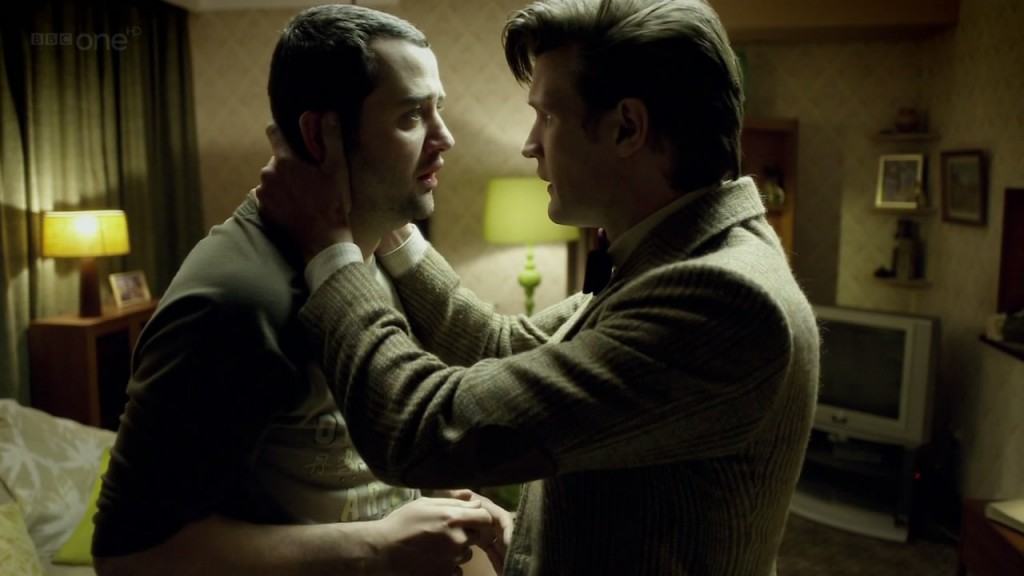
Spike: The only thing that stretched my disbelief in the episode was the fact the tower-block had functioning lifts.
Ian: That’s a pull-quote if ever there was one. The fact that people were willing to use them, despite the fact that they were working belongs in the same camp. You don’t need to use that specific lift to know it’s the kind you feel every rattle and bump in. The kind that sends your heart into your mouth when it comes to an abrupt stop.
Adam: You British people, with your “lifts” and your “cuppas” and your “lorries” and your “petrol” and your “torches”. Now that’s terrifying!
Spike: I never realised until now how onomatopoeic the English vernacular actually was.
Ian: Speaking of colloquialisms and local flavour, did anybody else find it very authentic that there was just a massive pile of bin bags piled up at those skips, in lieu of a sanitary solution? Not garbage, mind you. Bin bags. To me, an observation on British society that perceptive buys you all the giggling doll-people you can shake a sonic at.
Casey: I really got into this one. They pretty much had me with a red headed 7 year old boy. And that ending kind of killed me as well with the dad holding his son. And yes, the monkey was quite scared of this one. At one point I looked over and he had the covers over his head and just kind of peeking out to see what was happening.
Like the last one though, this episode seemed to introduce a storyline that Moffat and Company could come back to at any time. Last episode it was the Justice Bot and this one it is the idea of this alien becoming a child and growing as a human. What happens later in life (especially in puberty)?
This episode reminded me a lot of older Doctor Who I have watched on Netflix: one location (probably a soundstage); creepy, lumbering bad guys; and a bit of a haunting tone. I enjoyed it. It was a nice Saturday night creep-fest for the family.
Spike: I do appreciate that we have a show which over the space of three episodes can flit from Space-Opera, to a story about a commission of war-criminal hunters running around wartime Berlin in robots shaped like Nazi generals and Amy Pond, to a haunted house episode. It’s a testament to how flexible the concept of Who is, and next week’s episode (in which Amy appears to have become trapped in iPurgatory) seems to reinforce that.